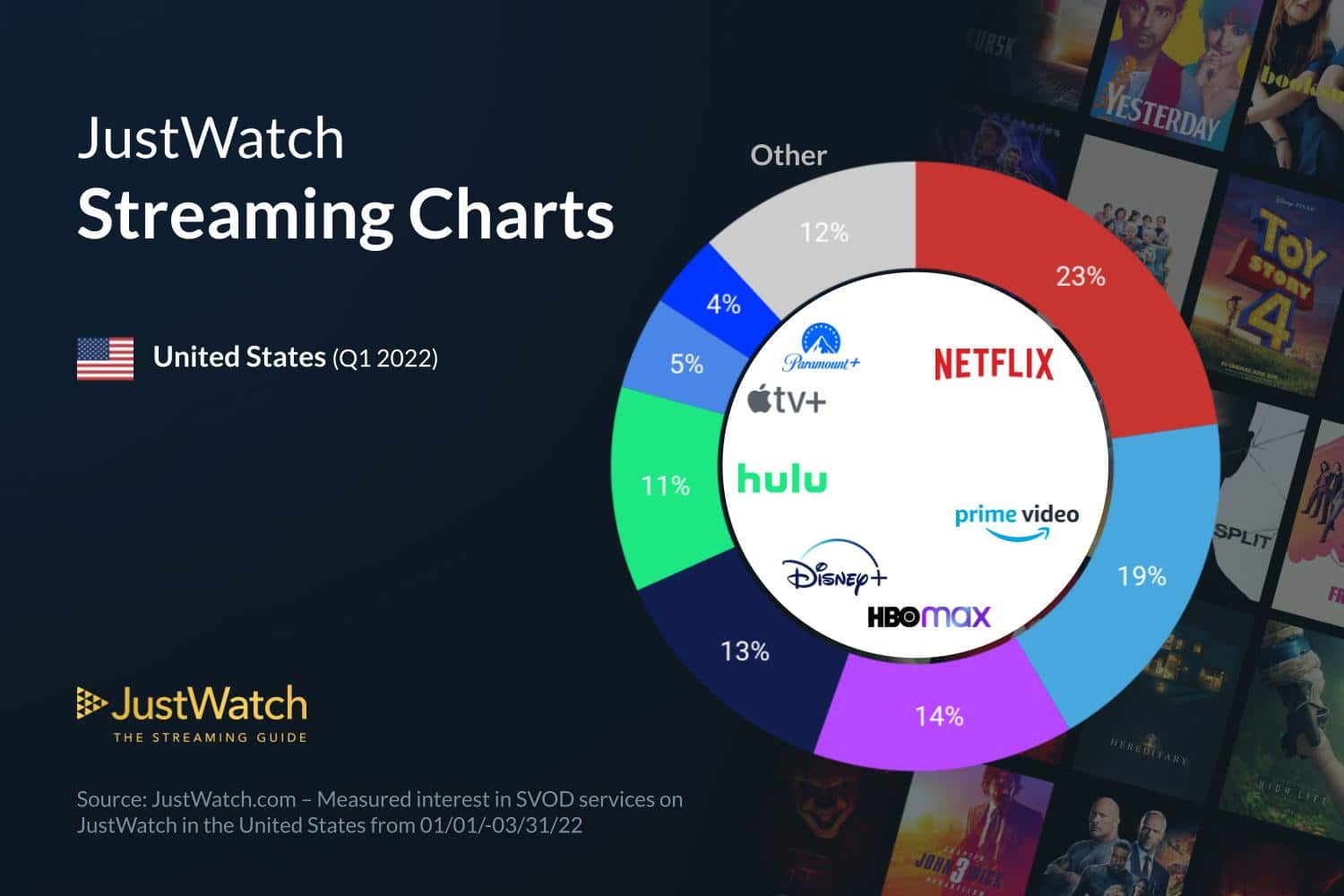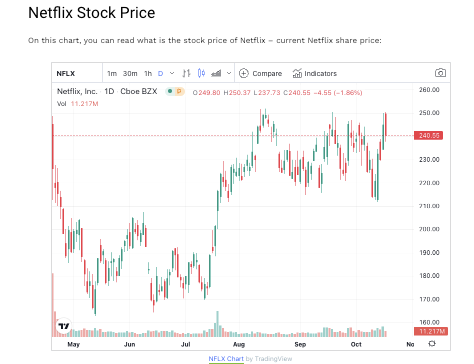With the popularity of streaming services like Netflix, DisneyPlus, HBOMAX, Hulu, and Amazon Prime, it can be difficult for companies to compete in this highly-saturated market. However, there are several strategies that these companies can employ to set themselves apart from their competitors. One strategy is to provide users with exclusive content or access to certain shows. Another strategy is to focus heavily on user experience, such as by offering convenient features like offline viewing or personalized recommendations. Additionally, many companies aim to differentiate themselves by targeting a specific niche audience or tapping into popular trends and fads. Ultimately, a successful streaming service must continue to evolve and innovate in order to keep up with rapidly-changing consumer needs and preferences in this dynamic sector.
Netflix, Inc. (NASDAQ: NFLX) today announced it will post its third quarter 2022 financial results and business outlook on its investor relations website at http://ir.netflix.net on Tuesday, October 18:
- In the third quarter Netflix made a net addition of 2.4m paying subscribers, compared to 1.0m expected, but 2m less than the same time last year
- Total revenue rose 5.9% to $7.9bn
- Operating margins were 19.3%, higher than the 16% expected, with operating profit benefitting from the higher revenue and timing of some spending
- The appreciation of the US dollar remains a “significant headwind” and Netflix warned of reduced demand visibility because of volatile macroeconomic conditions. Nonetheless, the group expects 4.5m new paying subscribers in the fourth quarter
- Netflix shares rose 13.1% in after-hours trading
Sophie Lund-Yates, Lead Equity Analyst at Hargreaves Lansdown:
“Netflix’s surprise subscription growth has truly stolen the show. Markets were braced for a far more measly set of results, but strong content from the likes of The Jeffrey Dahmer Story and latest instalment of Stranger Things appears to have convinced people to stick with the platform, and enticed newbies into the fold. Netflix was also keen to point out one of its core strengths – its maturity. This means that it’s successfully generating profits, which its younger rivals can’t boast. That’s something that shouldn’t be overlooked, but it’s also not enough to warrant a mic drop from the original streaming provider.
Being the biggest has been enough for Netflix to get by, but that’s no longer the case. While recent growth has been impressive, it still faces a balancing act of attracting new subscribers in the face of fierce competition all while trying to maintain discipline with its spending. The introduction of an ad-tiered system in early November is an attempt to make the service more attractive to a consumer-base which is tightening its purse strings. The total number of British homes with at least one streaming subscription fell by almost 1m from January to September, in a stark reminder of the changing consumer tide.
Netflix’s challenge is that its competitive edge is becoming dulled. Rivals are closing the gap on content quality. The payment reductions offered for the ad-supported version arguably don’t represent good market value either when compared to rival offerings, especially the Disney+ and Hulu bundle. The business risks seeing its more lucrative customers, who pay for higher resolutions and offline streaming, slide down into a cheaper plan. That means Netflix risks sacrificing margin in the name of stopping subscriber outflows, rather than replenishing the top of the funnel with new ones.
All told, Netflix has shifted the spotlight to a more flattering hue, but there are some sizeable competitive challenges waiting in the wings.”
The Content Quality is Good Enough?
The content market has seen explosive growth in recent years as new streaming platforms have emerged to challenge entrenched players like Netflix and Hulu. These new platforms, often built around a subscription model, have added significant competition to the market and dramatically increased consumer choice.
However, this rapid expansion does raise some important issues for content creators and distributors. On one hand, new entrants need high-quality content in order to gain traction with users; on the other hand, the proliferation of platforms means that competing content providers are forced to compete for a much smaller pool of viewers.
As such, content creators need to stay on top of these trends and adapt their strategies accordingly in order to avoid falling behind in an increasingly competitive market. At the same time, streaming services must be careful not to price themselves out of the market by making their subscriptions too expensive or by demanding unreasonable royalties from artists.
Overall, it is clear that there are numerous challenges facing both content creators and streaming services as they continue to evolve and grapple with a rapidly changing landscape.
And, What are the Exclusive Contents?

Read Best movies on Netflix right now.

HBO MAX
Exclusive content is an important part of any high-quality streaming service like HBO MAX. This refers to the unique series, movies, and other programming that are only available on a particular platform. By offering exclusive content, a service provider is able to differentiate itself from its competitors, while also attracting and retaining subscribers. At HBO MAX, we pride ourselves on our extensive catalog of exclusive content, which includes award-winning series like Game of Thrones and Big Little Lies as well as blockbuster movie franchises such as Harry Potter and The Matrix.
Read HBO Max Movies: Find the Best Movies and on HBO Max.
Exclusive content is one of the biggest selling points of HBO MAX, the highly anticipated new streaming service from HBO. This content typically refers to videos, shows, and movies that are only available on HBO MAX. Some examples of exclusive content currently available on HBO MAX include notable series like “Gossip Girl” and “The Newsroom,” as well as blockbuster movies like “Justice League” and “Interstellar.” Not only does exclusive content give subscribers access to some of the most popular shows and movies in recent memory, but it also helps to set HBO MAX apart from the other major streaming services out there.
DisneyPlus
Read Star Wars on Disney Plus: A comprehensive Guide 2022
Exclusive content in DisneyPlus refers to the variety of original programming and films that are available on the streaming platform. With a wide range of movies, TV series, short-form videos, documentaries, and more, DisneyPlus provides endless entertainment for viewers of all ages. Some of the most popular exclusive shows on DisneyPlus include popular franchises such as Star Wars, Pixar movies like Wall-E and Toy Story, and new hit series like High School Musical: The Musical and Descendants 3.
Read The Complete and Updated List of Marvel Movies in Order.
Additionally, DisneyPlus offers a variety of family-friendly films from classic animated films to modern Marvel superhero blockbusters. Whether you’re a longtime fan or new to the world of Disney, there is something for everyone on DisneyPlus!
Read The Best Disney Movies: Including Pixar, Disney and Star Wars.
Amazon Prime
Exclusive content on Amazon Prime refers to a range of original programming that is only available to members of the service. This content can take many different forms, from movies and TV series to stand-up comedy specials and music concerts. Some of the most popular shows available through Amazon Prime include hit programs like Transparent and Mr. Robot, as well as critically acclaimed documentaries like One Strange Rock.
In addition, Amazon also offers a number of exclusive live events, including major sporting events and touring music festivals like Outside Lands and FYF Fest. Overall, the combination of high-quality content with the convenience and flexibility of Amazon Prime makes it one of the top options for online streaming today.
Password Sharing Issue for Streaming Market or for Netflix?
With the rise of streaming services, password sharing has become a significant issue in the media landscape. Many consumers are feeling tempted by the easy access to premium content that these platforms provide, and some have taken to sharing their passwords with friends or family members in order to access this content for free.
However, this practice raises a number of concerns for both providers and users. For providers, password sharing has implications for revenue streams, as it compromises their ability to generate profits from subscribers.
Meanwhile, consumers often use multiple accounts at once, further limiting their viewing options and preventing them from getting the most out of the streaming experience. In light of these challenges, it is clear that we must look for ways to tackle the issue of password sharing if we hope to maintain a healthy and sustainable streaming market in the long run.
Netflix, Inc. (NASDAQ: NFLX)
Netflix is losing -2.08% (5.10). Nasdaq is +82.34 (0.74%) today.



